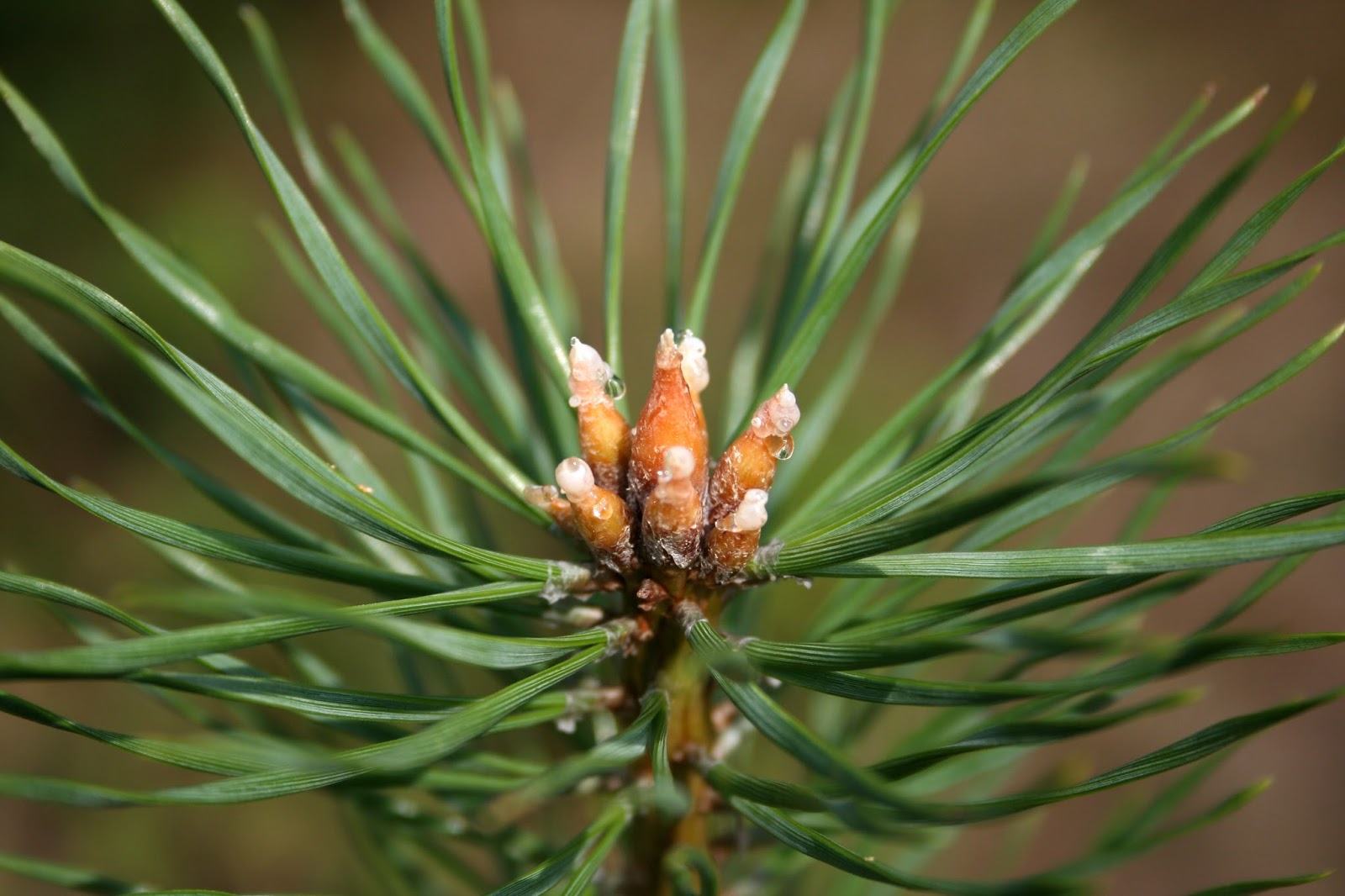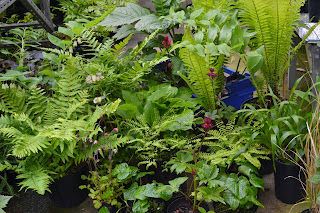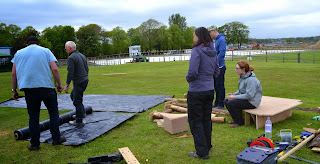 |
| Giggles all round at the end of a long day finishing building our two gardens |
We are building 2 show gardens for Gardening Scotland this year as part of our 2nd year Garden Design Studies. These are the "Readers Imagination Garden", and "In the Knitted Garden".
Show Garden 2015

Tuesday, 9 June 2015
Until Next Year
Bye bye from The Team!
Silver Gilt
 And we won a Silver gilt Medal for Kellie's Readers Imagination Garden!
And we won a Silver gilt Medal for Kellie's Readers Imagination Garden!Again, we are delighted!
 |
| Kellie in the outdoor library, and Jim from the Beechgrove having a wee sit doon in the Chesterfield |
Silver Medal
 We won a silver for Susan's In the Knitted Garden.
We won a silver for Susan's In the Knitted Garden.In spite of the troubles we had with some of the plants (Gossypium doesn't really like the climate in Scotland, sadly), we are delighted!
Roll on next year!
 |
| Susan explaining to George for the Beechgrove that sheep can't actually knit...their hooves catch on the yarn too much! |
Labels:
#beechgrove,
#gardeningscotland,
#intheknittedgarden15,
#sruc,
Silver
Thursday, 28 May 2015
Last Day of preparation
Just popping up a few photos of our last build day. The show starts tomorrow. Hope you can make it to Gardening Scotland.
Wednesday, 27 May 2015
Beech Grove garden
Both the gardens are nearly finished now and looking good. The Beechgrove Garden team were at Ingleston today for filming, however it was just too wet for them to film outdoors. We had a wee chat with Jim though.
 |
| Kellie and Janet chatting about the garden with Jim. Janet is just starting to stock the outdoor book shelf. |
Plant List for 'In the Knitted Garden
Information is given below about the plants included in the knitted garden. They are all linked to fibre, and cotton production.
In the Knitted Garden – Plant list
Visit our Show Gardens blog at http://srucshowgarden.blogspot.co.uk/ or scan the QR code
Bamboo
Phyllostachys ssp are amazing plants that can be used in many ways: Leaves and stems can be woven, or fibres can be extracted and spun into fine yarns. A type of Viscose can be manufactured from bamboo. A quick growing, prolific plant, it holds promise for being a very sustainable fibre crop.
Flax
Scotland used to be famous for its textile industries, especially for Linum ssp. The industry was stimulated by an act of Parliament of 1686 stipulating that everyone had to be "buried in linen winding sheets made from materials which had been grown, spun and woven in Scotland"!
Nettles
Before Flax production Urtica dioica, or 'Stinging nettle' was used to to produce the finest yarn. It was known as "Scotch Cloth".
Whilst Urtica dioica is great for biodiversity (being a food plant for many insects and birds), due to its stings it's not so nice as a garden plant! Therefore it has been confined to a pot and we have used a garden-worthy substitute - the 'Dead nettle' (no stings) otherwise known as Lamium maculatum. It is a useful ground cover plant available in several leaf varieties & flower colours.
Urtica dioica can also be drunk as a tea or used in soup!
Grasses
Grasses and sedges have been used for basket weaving, rope making and fibres since at least 3000BC (Ötzi, the mummified man found in the Ötztal Alps in 1991, wore a cloak woven from grasses.)
We have included several garden-worthy varieties, chosen for their foliage colour. These include: Carex elata; Uncinia rubra; Libertia peregrinans.
Papyrus
Cyperus, perhaps better known as a House plant or a plant of the Egyptian Nile, has also long been used for its fibres, producing both textiles and for making paper. It is a great plant for an ornamental pond, though not always hardy in Scotland.
Cotton
Probably the most well-known fiber plant, Gossypium ssp are the world’s biggest non-food crop. Cotton can be grown in Britain as a bedding plant, though light levels and rainfall in Scotland hamper its growth. We have chosen Lavatera ‘Silver Barnsley’, also a member of the Malvaceae family, to represent Cotton. A beautiful garden plant, it closely resembles the leave shape and flower of Gossypium.
We also have a pot of Gossypium seedlings and a vase of dried ‘cotton bolls’ on display.
Teasel
Dipsacus fullonum are still used today in the textile industry for preparation of various fibres into yarn. An interesting garden plant that is native to the British Isles. It is appreciated by wildlife for its seeds and pollen. In the Knitted Garden it is used for its architectural, fresh green foliage.
In the Knitted Garden – Plant list
Visit our Show Gardens blog at http://srucshowgarden.blogspot.co.uk/ or scan the QR code
|
Lavatera × clementii 'Silver Barnsley' Gossypium hirsutum (seedlings of hirsutum, Kundan, Red Beauty, Black Beauty) Cyperus diffusus Cyperus esculentus Cyperus alternifolius Phyllostachys aurea Phyllostachys aureosulcata aureocaulis |
Urtica dioica Lamium maculatum Libertia peregrinans 'Taupo Sunset' Carex elata Uncinia rubra Linum grandiflorum var rubra Linum grandiflorum 'Bright Eyes' Linum usitatissimum Dipsacus fullonum |
Bamboo
Phyllostachys ssp are amazing plants that can be used in many ways: Leaves and stems can be woven, or fibres can be extracted and spun into fine yarns. A type of Viscose can be manufactured from bamboo. A quick growing, prolific plant, it holds promise for being a very sustainable fibre crop.
Flax
Scotland used to be famous for its textile industries, especially for Linum ssp. The industry was stimulated by an act of Parliament of 1686 stipulating that everyone had to be "buried in linen winding sheets made from materials which had been grown, spun and woven in Scotland"!
Nettles
Before Flax production Urtica dioica, or 'Stinging nettle' was used to to produce the finest yarn. It was known as "Scotch Cloth".
Whilst Urtica dioica is great for biodiversity (being a food plant for many insects and birds), due to its stings it's not so nice as a garden plant! Therefore it has been confined to a pot and we have used a garden-worthy substitute - the 'Dead nettle' (no stings) otherwise known as Lamium maculatum. It is a useful ground cover plant available in several leaf varieties & flower colours.
Urtica dioica can also be drunk as a tea or used in soup!
Grasses
Grasses and sedges have been used for basket weaving, rope making and fibres since at least 3000BC (Ötzi, the mummified man found in the Ötztal Alps in 1991, wore a cloak woven from grasses.)
We have included several garden-worthy varieties, chosen for their foliage colour. These include: Carex elata; Uncinia rubra; Libertia peregrinans.
Papyrus
Cyperus, perhaps better known as a House plant or a plant of the Egyptian Nile, has also long been used for its fibres, producing both textiles and for making paper. It is a great plant for an ornamental pond, though not always hardy in Scotland.
Cotton
Probably the most well-known fiber plant, Gossypium ssp are the world’s biggest non-food crop. Cotton can be grown in Britain as a bedding plant, though light levels and rainfall in Scotland hamper its growth. We have chosen Lavatera ‘Silver Barnsley’, also a member of the Malvaceae family, to represent Cotton. A beautiful garden plant, it closely resembles the leave shape and flower of Gossypium.
We also have a pot of Gossypium seedlings and a vase of dried ‘cotton bolls’ on display.
Teasel
Dipsacus fullonum are still used today in the textile industry for preparation of various fibres into yarn. An interesting garden plant that is native to the British Isles. It is appreciated by wildlife for its seeds and pollen. In the Knitted Garden it is used for its architectural, fresh green foliage.
Planting list for 'The Readers Imaginatin Garden'
We hope you find the planting list of Interest. We have certainly enjoyed planning the plants, and then buying them from local nurseries. Thanks to Mac Plants and Binny Plants for their help and advice.
Plants for ‘The Readers Imagination Garden’
f interest.
Plants for ‘The Readers Imagination Garden’
|
A shaded/semi-shaded, woodland glade style garden Trees Alnus glutinosa Betula pubescens Pinus sylvestris Sorbus aucuparia (plus saplings) Shrubs Amelanchier canadensis Corylus maxima ‘Purpurea’ Rosa canina Sambucus nigra Viburnum opulus Ferns Adiantum pedatum Asplenium scolopendrium Dryopteris erythrosora var. prolifica Dryopteris filix-mas Metteuccia struthiopteris Polystrichum setiferum Climbers Hedera helix Lonicera periclymenum |
Plants, grasses, rushes Anemanthele lessoniana Anthriscus sylvestris ‘Raven's wing’ Aquilegia vulgaris var. stellata 'Ruby Port' Arum italicum ‘Pictum’ Asarum europaeum Astrantia major ‘Super Star' and 'Ruby Wedding' Dicentra formosa 'Cox's Dark Red' Digitalis purpurea 'Alba' Epimedium x perralchicum 'Frohnleiten' Epimedium 'Spine Tingler' Epimedium x rubrum Geranium phaeum var . samobor Geum marika Geum rivale 'Leonard's variety' Hostas - Mixed Lamium maculatum 'White Nancy' Lamium orvala Lilium martagon album Luzula nivea Myrrhis odorata Polygonatum giganteum Pulmonaria ‘Sissinghurst White’ Rodgerisia' Bronze Peacock' Rodgersia aesculifolia Rodgersia ‘Hercules’ Stipa arundinacea Symphytum officinale |
Thursday, 21 May 2015
Plants, props and walls
It's begun!
The Team are on site at Ingliston today, beginning to build the plots. How exciting! First off is the Reader's Garden, reassembling the base & outdoor library which had been constructed on Campus, whilst the lovely folk from the DSWA build the wall.


Saturday, 9 May 2015
"SRUC Students in a Spin Over Plans for Gardening Scotland"
Garden Design students from Scotland’s Rural College turned to a group of Model Engineers to help them build one of the show gardens planned for Gardening Scotland at Ingliston from 29th-31st May.
Read the full News article here about the help we are getting from ESME: http://www.sruc.ac.uk/news/article/1237/sruc_students_in_a_spin_over_plans_for_gardening_scotland
Read the full News article here about the help we are getting from ESME: http://www.sruc.ac.uk/news/article/1237/sruc_students_in_a_spin_over_plans_for_gardening_scotland
Friday, 1 May 2015
Constructive Fun
Another busy day yesterday preparing the show gardens. Lots of problems solved!
 Construction Team were busy beavers very kindly helped by Chris the Builder, who has sorted how to make the bookshelves for the outdoor library for #ReadersGarden15.
Construction Team were busy beavers very kindly helped by Chris the Builder, who has sorted how to make the bookshelves for the outdoor library for #ReadersGarden15.
Thank you Chris!

Glasgow Botanics have kindly donated some mature papyrus to #KnittedGarden15. Susan and Penny went over to collect, and then we got them potted up and fed to get them in tip top condition for the Show (the plants that is, not Susan & Penny)
Another Trip to Almondell to see ESME and look at how the turntable is progressing. Nearly there with a very elegant yet simple solution! Thanks to the guys!
 The Plant Team brought together a lot of the #ReadersGarden15 plants to see how they were all looking together. Have to say they were looking gorgeous! What a lovely woodland glade it is going to be. Photos don't do the plants justice!
The Plant Team brought together a lot of the #ReadersGarden15 plants to see how they were all looking together. Have to say they were looking gorgeous! What a lovely woodland glade it is going to be. Photos don't do the plants justice!
 Construction Team were busy beavers very kindly helped by Chris the Builder, who has sorted how to make the bookshelves for the outdoor library for #ReadersGarden15.
Construction Team were busy beavers very kindly helped by Chris the Builder, who has sorted how to make the bookshelves for the outdoor library for #ReadersGarden15.Thank you Chris!

Glasgow Botanics have kindly donated some mature papyrus to #KnittedGarden15. Susan and Penny went over to collect, and then we got them potted up and fed to get them in tip top condition for the Show (the plants that is, not Susan & Penny)
Another Trip to Almondell to see ESME and look at how the turntable is progressing. Nearly there with a very elegant yet simple solution! Thanks to the guys!
 The Plant Team brought together a lot of the #ReadersGarden15 plants to see how they were all looking together. Have to say they were looking gorgeous! What a lovely woodland glade it is going to be. Photos don't do the plants justice!
The Plant Team brought together a lot of the #ReadersGarden15 plants to see how they were all looking together. Have to say they were looking gorgeous! What a lovely woodland glade it is going to be. Photos don't do the plants justice!Friday, 17 April 2015
Sunshine for the soul
First session back after Easter, and we had a very productive day down at the greenhouse with the whole team.
Some of the plant team went off to R&B to purchase some more sapling trees whilst the rest began the construction for Readers Garden. Some lovely sedges were potted up from the gardens to bring them on for the Knitted Garden.
Tuesday, 14 April 2015
Sunday, 5 April 2015
Panda spotting
 |
| Phllostachys aureosulcata “Aureocaulis” |
 |
| Happy in the greenhouse. |
 |
| Some more nice big bamboos at R&B, destined for the Knitted Garden |
Cosy Tree
What has Susan been up to!
 |
| The girls taking a well earned lunch |
 |
| The Artist (Susan) contemplating the best way to work in all those ends... |
 |
| Cosy tree! |
 |
| It's very colourful too, amongst the drab of the granite paving. |
In a Woodland Glade
Beautiful woodland glade plants - see them in May at Gardening Scotland in The Readers Garden.
 |
| Lilium martagon 'Album' |
 |
| Fern with spores |
 |
| Pinus sylvestris |
 |
| Anthriscis sylvestris 'Ravenswing' |
 |
| Astrantia major |
 |
| Digitalis purpurea 'Alba' |
 |
| Geranium phaeum |
Tuesday, 31 March 2015
Author confirmed for Readings in the Readers Imagination Garden
| Janice Galloway |
Friday, 27 March 2015
Scottish Gardener Article
Plant Arrivals
About 250 plants have arrived for 'The Readers Imagination Garden' today. They will need to be carefully tended now to bring them up to Show Garden standard, and to be flowering at the right time. We have also been able to use many plants from the college nursery, and are expecting another delivery of plants on Monday-so It is all go!


 |
| Show Plants setting into the greenhouse at SRUC |
Tuesday, 17 March 2015
Every little helps...
We are still searching for a little bit more sponsorship, or donations, to purchase good quality plants, so if you have any spare change maybe you could...
Much appreciated!
"Help fund our student Show Garden"?
Much appreciated!
We're in the News!
 "SRUC Designers’ Double Entry for Gardening Scotland"
"SRUC Designers’ Double Entry for Gardening Scotland"Talks about both our entries.
Article can be found at: http://www.sruc.ac.uk/news/article/1182/sruc_designers_double_entry_for_gardening_scotland
Tuesday, 10 March 2015
Tiger nuts
 Cyperus esculentus is a perennial growing to 0.9 m (3ft) at a fast rate. It is hardy to zone (UK) 8. The flowers are hermaphrodite.
Cyperus esculentus is a perennial growing to 0.9 m (3ft) at a fast rate. It is hardy to zone (UK) 8. The flowers are hermaphrodite. Exciting to see things germinating already, in preparation for the Show!
The 'nuts' are actually a tuber from the roots. They are edible, and quite tasty too!
Read more about Tiger nuts: http://www.pfaf.org/user/plant.aspx?LatinName=Cyperus+esculentus
Subscribe to:
Comments (Atom)




















